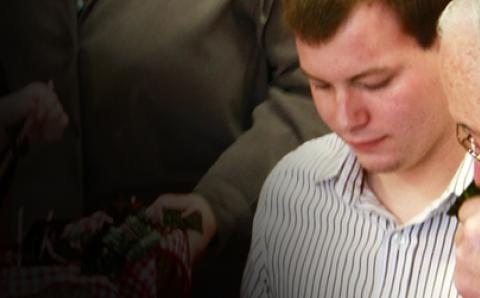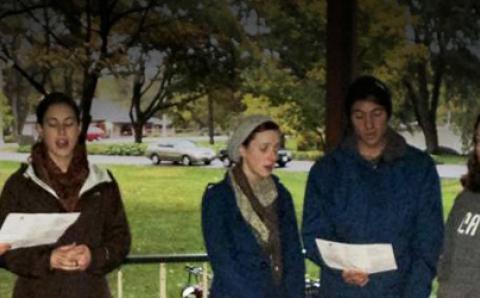During the past 15 years—really since the “women-in-office” synods in the early 1990s—I’ve watched as delegates to synods have strived to work together. Even as the issue of women in office lingered and other issues arose, the Christian Reformed Church has worked hard to stretch its tent enough to accommodate the diversity of opinions among us.
But a growing wind of suspicion or even mistrust seemed to gust in several discussions at Synod 2012. One person remarked, “It’s as if people came expecting the worst.”
A bit of skepticism isn’t always a bad thing. As a church, we are strongly committed to our confessional identity, so taking the time to deliberate over the details of how we live that out is surely in order.
But how much is too much? Does our tent keep getting bigger because we’re growing further apart on basic issues?
Who Should Speak? What Should Be Said?
While discussing the Creation Stewardship report, some delegates expressed suspicion of the science regarding climate change, despite the study committee’s report that 97 percent of the international scientific community agrees that global warming is real and is likely caused by humans.
In other discussions, some delegates expressed distrust in what one called “the Grand Rapids elite.” One pastor said that more and more people in his congregation are saying they do not want the denomination speaking for them—especially when it comes to political matters. “They are growing frustrated,” he said.
That distrust showed up again when it was time to review the work of the Office of Social Justice. Many delegates would have preferred that synod simply recognize OSJ’s work, not commend it, because, as one delegate said, “[OSJ] has been very selective in one end of the political spectrum in what they choose to advocate for.”
Delegates even debated at length whether the church should speak out on political issues.
Many delegates seem to distrust what gets decided at the synodical level, preferring local control. Only by a narrow margin did synod say no to a request requiring that changes to the Reformed confessions be approved by two-thirds of the classes before they could be adopted.
When the Christian Reformed World Relief Committee asked to change its name, some were suspicious that the organization is subtly trying to slip away from the CRC. “Don’t take Christian Reformed out of the name,” pleaded one delegate.
The new hymnal ran into that same distrust when some delegates didn’t want to approve it because they hadn’t seen all the songs, despite the fact that the editorial committee creating the hymnal includes seven people with theological degrees.
The discussion of the Belhar Confession resulted in synod creating a new category: “Ecumenical Faith Declaration.” Many reluctantly agreed to support that, provided synod revisit full adoption as a confession in a few years. Synod agreed to the former, but not the latter, leaving many who had reluctantly agreed to that new category disappointed, perhaps even mistrustful, after their concession on the one side was not matched by the other side.
Even young adults, who held their own re:kindle conference in conjunction with synod, are feeling disenfranchised. Their original plan to hold a sort of mini-synod was shelved because, as one organizer put it, “We aren’t listened to at the local level, so why would it be different at synod?”
One delegate said, “We are a small denomination that needs a large tent.” But at what point do the seams of the tent start to split?
And Yet . . .
And yet. Maybe the tent can withstand the prevailing winds, at least for a while. Despite some suspicions and mistrust, discussions are much more respectful and honest than they were back in those “women in office” synods, where, on both sides of the issue, it was sometimes more about politicking than deliberating.
On climate change, delegates acknowledged with respect to creation care that the scientific community is largely of one mind. And they agreed that churches, even while discussing such contentious issues, need to “receive each other in love and encourage each other to be more stewardly, to the glory of God.”
Delegates acknowledged that even if they didn’t approve of some of the positions taken by the Office of Social Justice staff, OSJ is doing good work.
Delegates affirmed synod as the place where decisions about the confessions are made.
Delegates trusted CRWRC enough to let it adopt a new name that doesn’t include our name: World Renew.
A majority of delegates trusted the hymnal editorial committee enough to endorse the new hymnal, sight unseen.
Young adults who attended re:kindle were encouraged enough after delegates spent time listening to and praying with them that they are excited to continue the discussion at a local level.
The Covenant for Officebearers was finally adopted, unanimously, on its third trip to synod, after the committee that drafted it showed a great willingness to bend by reinserting language that had been excised earlier.
Even in its disappointment that the Belhar was not adopted as a confession, the Ecumenical and Interfaith Relations Committee that had championed the Belhar for years graciously said it wished to be part of any effort to attain the most unity in relation to the Belhar.
In the Silence, Hope
But what gives me hope was not any decision taken or any speech given in plenary sessions.
What gives me hope happens in the advisory committees where delegates meet for the first two days of synod. Each committee deliberates and then serves synod with the best advice on how to deal with each of the agenda items assigned to it.
I spent several hours sitting in on various committees as they did their work. There were no microphones, no webcast that the folks back home were watching, no speeches, no posturing.
Instead, the roughly 20 people in each group talked and listened to each other. In one committee, when the discussion reached an impasse, the chair called everyone to several minutes of silence, and then they prayed together. Then they went again about their work.
It brought to mind the words of a song I learned at this synod (from the new hymnal):“I will come to you in the silence. I will lift you from all your fears. You will hear my voice. . . . Be still and know I am here.”
In a week filled with so many, many words, it was in that silence that I found hope that our tent will continue to hold.
About the Author
Gayla Postma retired as news editor for The Banner in 2020.









